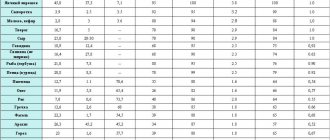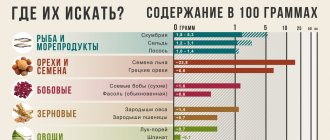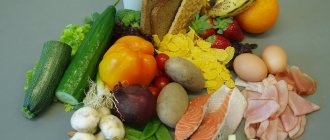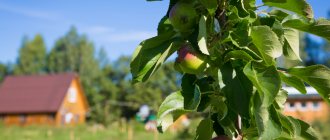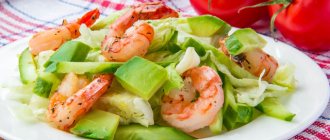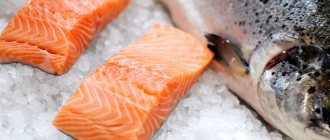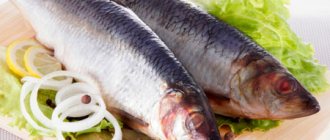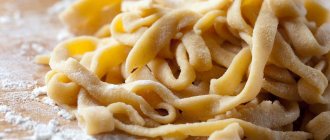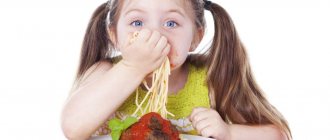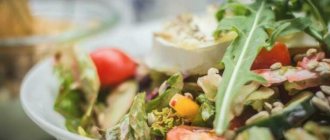Vegetarianism
is a way of life characterized by the fact that the flesh of any animals is excluded from consumption.
In this article I will try to answer the question: “ what do vegetarians eat
?”
There are several types of vegetarianism
Lacto-ovo vegetarians do not eat meat or fish, but do consume eggs, dairy products and honey.
Lacto-vegetarians, in addition to meat and fish, give up eggs but keep dairy products and honey.
Ovo-vegetarians do not eat meat, fish or dairy products, but do eat eggs.
Vegans (or strict vegetarians) abstain from eating all animal products, including eggs, dairy products and honey. They also generally do not use fur, leather, silk or animal hair.
Raw foodists eat food that is not subject to heat treatment, which allows them to preserve the maximum amount of nutrients.
Many people don't always think about why they eat certain foods, and habits that are considered normal in society can be ignorant and destructive. In this article, we will try to understand why people are moving away from the eating patterns that have taken root in modern society and what they eat.
Review your basic daily calorie limit
When you lose weight, the hormones that control your energy intake cause your body's overall metabolism to decrease.
Typically, it slows down by 40 calories per day for every pound of weight you lose. To lose weight, you need to burn more calories than you consume. Since you're burning less now than before, you'll have to make some adjustments to your menu.
You can calculate the difference in how your metabolism works by multiplying your weight loss by 40 calories. You will likely need to burn about 100 to 200 calories per day to continue losing weight at the same rate as before.
Vegetarian fish recipe
Why not? Don't let the name of the dish confuse you. The main ingredient replacing natural fish is paneer cheese. But if you're eating vegan, you can get by with tofu, just make sure it's firm, with minimal water.
You will need:
- Paneer or tofu – 150 gr.
- Water – 100 ml.
- Flour – 2 tbsp.
- Turmeric and ground black pepper – 0.5 tsp each.
- Nori seaweed – 3 sheets.
Make the batter: mix flour, salt, spices and water; the paste should not be very thick. Cut the cheese into small cubes, and use scissors to cut out rectangles of the same size as the cheese from the seaweed.
Place the nori in water for a couple of seconds, wrap it around the cheese and dip it into the batter. Fry in a small amount of vegetable oil until deliciously golden brown. The result is a delicious “fish” dish, without the slightest hint of seafood! Bon appetit!
What do you think - how does giving up seafood affect our condition? Tell us in the comments, and at the same time, subscribe to blog updates to keep up to date with the news!
Keep a food and exercise diary

Source here and below: Pexels
As you approach your ideal weight, you can begin to take a more relaxed approach to your diet and the amount of exercise per week. But in fact, you must be even more vigilant than before.
Be responsible by keeping a food diary or using a calorie counting app. Compare the amount you consume with the amount you expend. Be as honest and accurate as possible.
How to replace fish for a vegetarian
- The protein contained in fish is replaced by soy, tofu and legumes.
- An additional source of amino acids are all types of nuts and mushrooms. Cashews will also provide the body with phosphorus.
- Flaxseed is a package of fatty acids, calcium, zinc and iron. To obtain maximum benefits, it is better to grind the seeds into flour and consume them as porridge.
- Seaweed and seaweed contain iodine. By the way, kelp with carrots, nuts and lemon juice makes an excellent vitamin salad.
Adjust your nutrient ratios
Low-calorie diets are more effective than others, but they can be quite difficult to follow. In addition, often with this type of nutrition the body lacks the necessary substances.
Adjust your diet so that you consume more protein (most of it from lean sources) and fewer carbohydrates. Try eating nuts, lentil soup, chickpeas, whole wheat pasta and vegetables.
Official point of view
Experts from the American Academy of Nutrition and Dietetics have concluded that vegetarian and even vegan diets can be healthy if planned correctly.
Arguments for
To criticism, adherents of vegetarianism respond that this lifestyle allows:
- Eat food that is full of vitamins and contains a minimum of carcinogens.
- Reduce the risk of cancer, problems with blood pressure and the cardiovascular system, diseases such as diabetes and atherosclerosis.
- Lower the level of “bad” cholesterol.
- Avoid obesity, although this diet is not recommended to be followed on a diet.
- Increase energy, strengthen immunity and increase life expectancy.
- Avoid puffiness as vegetarian dishes contain little salt.
- Protect yourself from antibiotics and hormones that farmers use to grow animals.
Well, the well-known argument is the refusal to deliberately kill animals.
Pros against
And here is what opponents say, and their arguments are also supported by scientifically based research:
- Vegetarians, and even more so vegans, refuse two important substances necessary for the human body contained in meat: iron and vitamin B12.
- In addition, plant foods are not rich in iodine, calcium, amino acids and vitamins B2 and D, and this causes problems with teeth, nails, hair, bones, gastrointestinal tract and thyroid gland.
- Vegetarians often have menstrual irregularities.
- Too much plant fiber can reduce immunity, cause muscular dystrophy and fatigue.
Whether all of the above is good or not, I would like to note that among Caucasians who do not deny themselves fried meat, there are a lot of long-livers. And pregnant women, nursing mothers and teenagers need the microelements that meat contains.
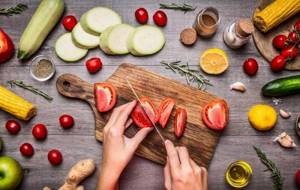
Well, a couple more points.
- Not all catering establishments have a menu that offers a wide variety of vegetarian dishes.
- Saving? It is not true. It is unrealistic to eat soy alone; in order to diversify their diet, vegetarians often have to fork out money for fruits and vegetables, the prices of which increase markedly out of season.
By the way, if we approach the issue from an ethical point of view, we should not forget that plants are also living and many studies have confirmed that they also feel pain and suffer when they are plucked.
Vegetarianism and fish. Grocery list
Having switched to a vegetarian diet, many people begin to eat more varied. The reason is partly that while you stick to the generally accepted menu, you don’t pay attention to much and follow the path of least resistance: if you want something tasty, just order a steak or buy shrimp. With the transition to vegetarianism, it becomes clear that meat needs to be replaced with something, and it turns out that there are many other delicious products on sale.
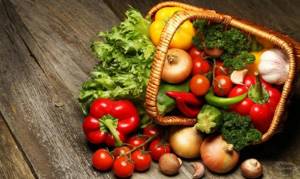
Vegetables
Vegetables contain almost no fat and protein, but are rich in vitamins, minerals, and fiber. Parsley, cabbage, parsnips and onions contain phosphorus, which is essential for human health. Lettuce, beets, cucumbers and tomatoes are rich in iron, and spinach is rich in calcium. A vegetarian diet allows the consumption of all vegetables:
- Potato.
- Carrot.
- Zucchini and squash.
- Radish and celery.
- Tomatoes.
- Cucumbers.
- Spinach.
- Cabbage.
- Broccoli.
- Capers.
- Celery.
Vegetables can be used to prepare salads, main dishes, and juices. These foods are rich in carbohydrates, so you will not feel low on energy. The record holder for calorie content is potatoes containing starch.
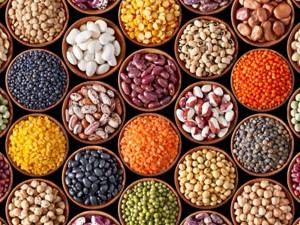
Cereals, legumes, nuts
Cereals and their derivatives are cereals, porridges, flakes, breakfast cereals, pasta and spaghetti, as well as baked goods. Include in your diet not only rye, wheat, millet and barley, which are familiar to our latitudes, but also less popular grains. For example, diversify the menu with bulgur and couscous.
Legumes are a valuable source of vegetable protein. This product category includes:
- beans;
- soy;
- peas;
- lentils;
- chickpeas
Don't forget also about nuts - a source of proteins and fats. They can be added to desserts, salads, snacks and baked goods. Nuts are eaten raw or fried in a pan. Don't limit yourself to walnuts and hazelnuts: there are also peanuts, cashews, pistachios, almonds, pine nuts and coconuts.
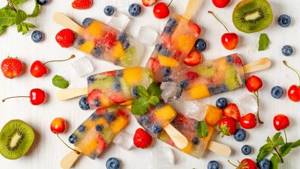
Fruits and sweets
Fruits contain many vitamins and minerals, they are rich in carbohydrates and fiber. To get your daily requirement of vitamin C, an apple, an orange and some strawberries are enough. It is not necessary to eat fruits without any frills; you can prepare fruit salads, fresh juices and desserts such as jam, preserves, Turkish delight, and candied fruits.
A separate vegetarian food item is dried fruits. They are designed for long-term storage and contain an increased dose of nutrients.
Vegetarians can eat other sweets that do not contain fruit, but if you are a strict vegan, then make sure that the sweets do not contain gelatin, which is obtained from animal cartilage and tendons.
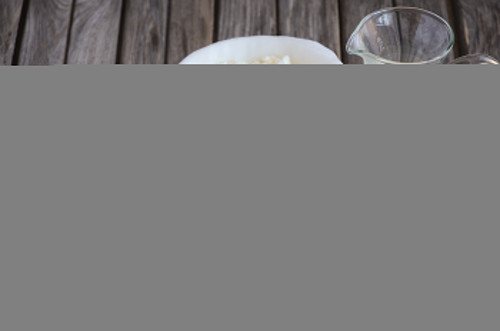
Dairy
This is milk and everything that is prepared on its basis:
- Cheeses.
- Cottage cheese.
- Yogurt.
- Cream.
- Sour cream.
- Ice cream.
- Dairy and fermented milk drinks.
In addition to the fact that it is an excellent source of protein, dairy foods have other advantages: cottage cheese is a source of calcium, yoghurt is good for digestion. If you are trying to completely eliminate animal foods from your diet, pay attention to the rennet content in cheeses - this is an extract from the stomachs of calves. Look for products with plant-based enzymes.
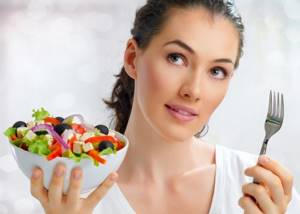
Minuses
As elsewhere, there are some disadvantages of adding fish products to the diet:
- Most water bodies where fish are caught are heavily polluted with garbage, waste, chemicals, and toxic substances.
- The pescatarian diet (fish) is contraindicated for diabetics.
Note. Fish oil stops the production of insulin.
- Fish is considered one of the most powerful allergens, even after heat treatment.
- Deficient intake of calcium and magnesium into the body.
- Smoked, pickled fish contains many carcinogenic substances that contribute to the formation of malignant tumors.
Vegetarian and pescatarian diets
Vegetarians do not eat animal meat. Thus, according to this definition, fish and seafood are not vegetarian (1).
Some vegetarians, known as lacto-ovo vegetarians, eat certain animal products, such as eggs, milk and cheese. However, they do not eat fish.
If vegetarians include fish and seafood in their diet but avoid meat from other animals, they are considered pescatarians.
However, whether pescetarianism is a separate diet from vegetarianism is a matter of interpretation. Those who primarily eat a completely plant-based diet with occasional consumption of fish and seafood may still be considered vegetarian by some people.
Those who follow other forms of a primarily plant-based diet, such as a flexitarian or Mediterranean diet, can also eat fish and seafood (1).
Summary:
Since fish and seafood are considered animal meat, they are technically not vegetarian. If someone eats these foods while following a vegetarian diet, they are usually called a pescetarian.
Excuses
Note!
One of the main tenets of vegetarianism is the reluctance to eat food with negative energy. According to vegetarians, cruel treatment of animals during their slaughter contributes to the poisoning of meat flesh with bad adrenaline.
Pescetarians believe that fish do not experience pain and suffering and thus justify eating them. However, this argument is quite controversial, and most likely incorrect. If you pay attention to the barbaric way in which fish are caught using a trawl net in an industrial way, then there is no more humanism here than in the slaughter of livestock. Many fish die while still in the water from the pressure exerted on them by the large mass of caught fish; some specimens even have their eyes fall out of their sockets. Here, classical vegetarianism clearly wins in terms of the ideology of this lifestyle.
Benefits and harms
The benefits and harms of the pescetarian lifestyle directly depend on the beneficial and harmful properties of the fish component of this food system. The following positive qualities can be highlighted:
- fish meat is digested much better than the meat of warm-blooded animals;
- helps reduce cholesterol, large amounts of which create problems with blood flow;
- a pescatarian diet improves vision, rejuvenates the skin, strengthens hair roots and nail plates on the hands and feet;
- metabolism is normalized and, as a result, the person has a weight appropriate for his age and height;
- the presence of fish in the diet provides the body with vitamins D, B12, omega-3 fatty acids, and iron microelements;
- efficiency increases, mood is at an excellent level;
- During pregnancy, a pescatarian diet provides all the necessary nutrients to both mother and child. It is preferable to meat;
- excellent prevention of diseases: anemia, various pulmonary diseases and physical weakness.
The disadvantages of pescatarianism, in addition to the possibility of toxin poisoning mentioned above, may include the following factors:
- insulin, which is the first resort in the treatment of diabetes, is blocked by fish oil and pescatarianism is contraindicated for diabetics;
- fish is a strong allergen, even after heat treatment it does not lose this bad property;
- when consumed smoked or canned, it becomes a source of carcinogens entering the body, which can trigger the formation of malignant tumors.
Pescetarianism is not pure vegetarianism. However, the benefits of a combination of plant foods and fish meat, although it has the not very pleasant name of pseudo-vegetarianism, do not become less because of it.
Who is a vegan
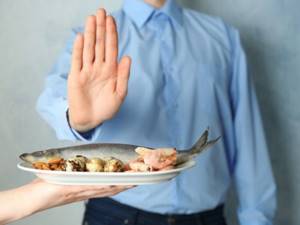
Before raising the issue of eating fish, it is necessary to determine what food boundaries a vegan falls within. The “plant” movement is a whole way of life, following which a person will independently determine the conditions and diet that are comfortable for him. According to this principle, vegetarianism is divided into several movements.
The strictest is veganism, which involves consuming only products of plant origin. Is it possible to eat seafood and fish? Let's look at some pros and cons that will help you understand this issue in detail.
What vegetarians shouldn't eat
If you, as a conscious person, strive to minimize the harm caused to the environment, it is also important to become familiar with those products where traces of murder and violence may be hidden. We provide a list of the most common products.
Albumin is dried stabilized whole blood or formed elements of animal blood. Light albumin is used instead of the relatively expensive egg white in sausage production, in the confectionery and bakery industries, since albumin beats well in the presence of water and forms foam. Black food albumin, from which hematogen is made, contains a huge number of allergens, primarily from erythrocyte membranes. For this reason, when consuming hematogen, allergic reactions are detected in children and adults.
Vitamin D3. Fish oil can be a source of vitamin D3.
Gelatin.
Its production uses meat, joints, tendons of cattle, most often pork, as well as seafood. Through complex production processes, an extract of sticky substances is formed from this raw material; it is of protein origin, since eighty-five percent of gelatin consists of protein. Today, gelatin is used in the production of marmalade, creams, soufflés, jelly, marshmallows, aspic, and aspic. But it is used not only in the food industry, but also in pharmacology, the photographic industry and cosmetology.
Abomasum.
Usually produced from the stomach of calves. The production of most cheeses and some types of cottage cheese cannot be done without rennet. There are cheeses that do not use rennet, for example, Adyghe cheese. You can find other rennet-free cheeses - read the labels carefully. Examples of non-animal rennet names: Milase, Meito Microbial Rennet (MR), Fromase®, Maxilact®, Suparen®.
Cheap butter.
Some cheap butter, some spreads, mixes and margarines, and store-bought ghee may contain seal or fish oil.
Therefore, you should not save on the price of butter, and it is better to make ghee yourself.
Pepsin
- an ingredient of animal origin, an analogue of rennet. If the packaging states that pepsin is microbial, then it is of non-animal origin.
Lecithin
(aka E322). Vegetarian and soy lecithin are considered vegetarian, and non-vegetarian is when it is simply written: “Lecithin”, because. it's made from eggs.
Coca-Cola and other drinks containing red dye E120 (carmine, cochineal), produced from insects.
Helpful information
Having decided to join such a movement, a person should ask not only such questions as “do vegetarians eat fish or not and what can be consumed in general.” To become a supporter of this diet, you must first prepare for this psychologically, and also discuss possible contraindications with your doctor.
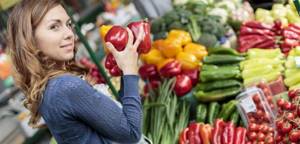
There is no doubt that for many people, the transition to such a food system is the beginning of a new stage in their life, since vegetarianism is not only a refusal of any foods, but is also considered a kind of philosophy of human existence.
